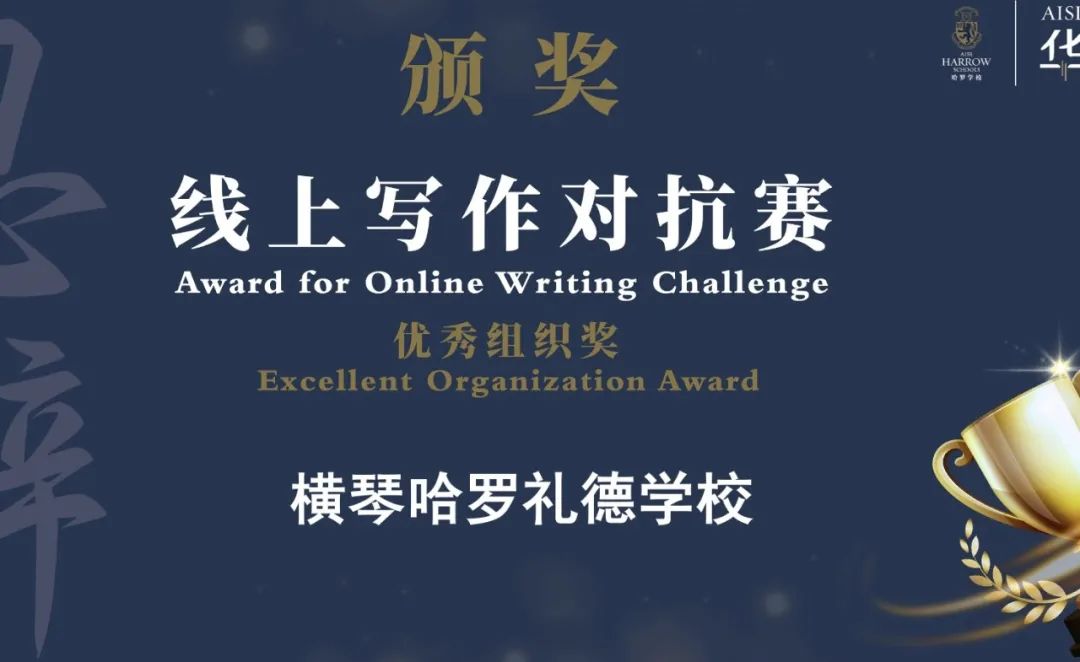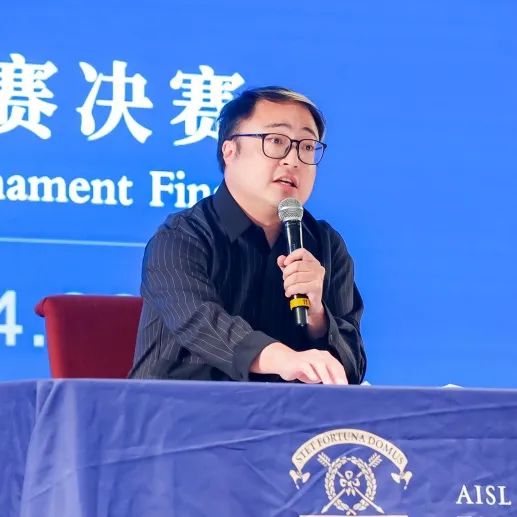2024-04-28发布于广东

←Swipe for English Version←

4月20日下午
首届AISL哈罗华声杯
口述辩论赛决赛
在哈罗横琴成功举行!
AISL哈罗学校9校联合
共探未来世界发展的重要议题
淋漓尽致地展示了哈罗学子的妙语捷思和自信风采!
AISL 哈罗华声杯-思辩赛由集团旗下12所哈罗学校中的9所(北京、上海、香港、深圳前海、海口、重庆、南宁、横琴)共同参赛,规模创新高,并携手知名专业机构 “纵横思辨” ,持续提升教育卓越。赛程涵盖线上写作对抗赛和口述辩论赛,全面考验选手们的逻辑思辨能力和现场表现力。
本次口述辩论赛采亚洲杯专用赛制,比赛分成4个环节,分别为三轮申论与质询答辩环节、小结环节、自由辩环节与结辩环节。经过紧张激烈的比赛,热烈祝贺以下哈罗横琴获奖选手!
口述辩论赛决赛(高年级组)
辩手
Swetty T.
Sissi Y.
口述辩论赛决赛(低年级组)
辩手
Eric Z.
Channing X.
同时祝贺哈罗横琴荣获
线上写作对抗赛优秀组织奖!


古语云:
“议论所存无赘学,声华此去有真知。”
怀着让世界更美好的初心
在激烈的口述辩论赛过程中,
各个哈罗学校的选手们
彼此碰撞思想、集思广益
为未来种种挑战打开了新思路

王彦博老师
亚洲思辨教育学会主席、
AISL哈罗“华声杯”
口述辩论赛评审
“辩论真正在带给大家的是什么?我们从发现一个问题到去思考这个问题,到去解决这个问题,它是一个过程。辩论就是透过每一个跟我们真实世界相关的议题,让我们、让孩子、让自己讨论的团队,共同去找到答案。”


每一场比赛都非常精彩
在此我们回顾一下总决赛那些惊艳众人的论点
展开一场思维的激辩吧!
请谨记辩论没有绝对的是非对错,
更没有标准答案,
而是横看成岭侧成峰的多维思考和启发
也是我们和孩子们共同寻找答案的过程
(由于文章篇幅限制,
论点摘抄在维持原意的基础上有略微简化)

低年级组辩题
正方(哈罗海口):
当今社会应该接
纳年轻人以网红
作为职业目标

反方(哈罗重庆):
当今社会应该警
惕年轻人以网红
作为职业目标
点击照片,查看精彩发言↓

现如今社会的多元化发展,我们必须拥有更大的包容性去接纳发生的一切。职业是不分高低贵贱的,网红只是通过一种渠道来宣传作为自己的谋生手段,我方找不到任何不接纳的理由去阻止年轻人未来的一条发展道路。
首先要明确什么是警惕,警惕是对一个事物保持敏锐的触觉,什么是职业目标?职业目标是一个人对未来奋斗做一个长期的规划,而网红职业对当代年轻人的负面影响和不稳定的经济收入,以其作为职业目标都应当抱有警惕之心。
我们接纳网红作为职业目标,是说将这一个职业目标融入进我们正常的社会体系,且这个职业已经被列入我国的法律法规之中,为什么不能被大众接纳呢?
网红会给青少年带来一定的负面影响。我们所看到的是那少数主播和他们光鲜的一面,而忽略了他们背后的公关团队,让青少年们误以为当网红是一件很容易的事情,这是一种非常明显的放大效应,造成了我们以为网红赚钱快很风光的总体印象。
但别的职业难道不难吗?据调查显示,一个律师考律师证,有50%的人会被刷下来,然后等他能找到一个好的律所,又有25%的人会被刷下来。同时律师也有基本工资,还有一个最低的限度。网红没有最低工资,因为他只要成为网红之后,向大家宣传自己的知识,自己的学识,他也可以获得经济流量。
如果一个没有学识的人,没有才华的人,怎么去做网红,他做任何工作都挣不到工资。的确成为网红门槛是非常低的,然而当一个网红特别简单,当一个成功的网红那是难上加难。大家以网红为职业目标的原因几乎都是非常省力,非常好挣钱,因此很多人对网红没有一个很清晰的认知,我们应该抱有一个警惕的态度,告诉这些年轻人,这水太深了,你把握不住。
接纳和警惕并不是反义词,警惕正是为了让网络环境变得更好,比如说我们不远千里来到珠海,在坐飞机之前要进行安检,我们身上都没有携带任何危险物品,但是我们无一例外都要接受安检,你难道能说这些安保人员太可恶了,不能警惕我们。警惕是为了让这个环境变得更好更纯洁。
但网红的优良信息传播能力也是不容小觑的。为社会带来的好处和优点,不能够以部分网红带来的恶劣影响,以偏概全,以点概面。对于朝气蓬勃的年轻人来说,成为网红是自我价值的实现和梦想的追求,他们可以通过自己的努力和才华,在社交媒体上获得认可和关注,从而获得成就感和自信心。这种自我价值的实现有助于提高个人的心理健康和生活质量。
现如今社会步入了网络化时代,年轻人之间的信息流量也越来越庞大,职业技能也需要大量的创新,我们应该接纳当今社会的年轻人,出现适应社会发展的更多需求。
网红是一个大浪淘沙的职业,互联网十几年发展,从文字再到短视频时代,网红们一浪浪被拍在沙滩上,有多少名字成为昙花一现,又有多少追梦人成为背景板。因为网红这个职业富裕起来的人是非常少的,这是一种很明显的放大效应。
当今社会应该警惕年轻人把网红作为职业目标,理由有四个。第一,数字化和和数字化的快速变化,使得网红作为职业的不稳定性非常高,无法保证长期的经济安全和职业发展。
第二,频繁使用社交媒体和追求网红身份的个体,非常可能发展出物质主义和自我促销的倾向,这种价值观的偏移可能导致年轻人忽视其他重要的生活方面,比如人际关系和个人成长。
第三,网红职业对年轻人的心理健康构成潜在的威胁,增加了焦虑抑郁等心理问题的风险。网红经常面临来自公众的点评,恶意点评还有高期望,这种持续的社交压力非常可能导致心理健康的问题加剧。
第四,网红文化很可能对社会产生负面的影响和扭曲青少年的成功观。年轻人想要当网红,需要付出非常多的努力,没有一番风雨怎能看到彩虹?如果年轻人真正当上了网红,他们看到的是彩虹吗?并不是。当上网红就意味着处处被密切关注,如果在公共场合一不小心做了不恰当的小举动,放在普通人身上没多大问题,放到网红身上就非常可能变成网暴人传人恶意的评论四处传播,而最近因网暴而自杀的网红又不计其数。
我方认为我们不应过度警惕年轻人选择网红作为职业目标。首先我们必须承认网红作为一种新兴职业,确实为年轻人提供了更多的职业选择。在互联网时代,信息的传播速度和广度前所未有,网红通过自身的才华和努力,能够在短时间内积累大量的粉丝和影响力,从而实现个人价值最大化。
这种职业路径不仅符合年轻人的个性特点,也符合过社会发展的趋势。网红职业并非没有门槛,想成为一名网红,不仅需要具备独特的才艺和表现力,还需要付出大量的时间和精力去经营自己的社交媒体账号,这种努力并非轻松可得,而是需要年轻人具备坚定的信念和毅力,因此我们不能简单地将网红视为一种简单快捷的成功途径,而忽视其背后的付出和努力。
再者我们应该警惕的是年轻人的盲目跟风和不理性追求,而不是网红职业的本身。在当今社会各种职业都有其存在的合理性和价值。年轻人选择网红作为职业目标,是他们根据自身的兴趣和能力所做出的选择,我们应该尊重他们的选择,同时引导他们理性看待这一职业。
最后我们需要认识到网红职业并非年轻人的唯一选择,我们可以鼓励他们探索更多的职业可能性,这样才能培养出更多具有创新精神和实践能力的年轻人,为社会注入新的活力。

高年级组辩题
正方(哈罗深圳):AI会带来更多的平等

反方(哈罗海口):AI会带来更多的
不平等
点击照片,查看精彩发言↓

AI数据库的客观性可以帮助消除人类决策中的偏见。在过去的决策过程中,人类往往会受到自身认知偏见的影响,例如性别、种族、年龄等偏见,相较于人类,他们更有可能做出客观无偏见的判断,而AI可以通过对大量数据的分析,找出这些偏见并且纠正,在决策过程中尽量避免这些偏见的影响。
其次AI带来更多程序平等,通过使用AI算法,许多决策过程可以被标准化和系统化,这使得决策的依据更加透明和可理解。
在过去由于信息不对称等原因,往往会造成资源分配的不平等,而AI可以通过对大量数据的分析,更准确地预测社会的需求,从而实现更加高效的分配。例如在医疗领域,AI可以通过对患者数据的分析,为患者提供更加个性化的治疗方案,从而提高治疗效果,实现医疗资源的公平分配。
AI带来更多的不平等原因有三点,第一,AI带来的不平等在于科技发展水平的严重不均。
首先AI是由美国主导,发达国家引领的科技创新,发展中国家在AI领域仍处在一个追赶的位置,这是严重的科技差异。既然大家觉得人类的社会发展是平等的,但是在现实中的部分国家却让AI技术变成了限制别人的手段,这不就是不平等吗?
第二,AI带来的不平等在于机器自我意识觉醒的严重危害性。AI不是互联网,不是我们揣在口袋里的手机,我们不能把简单的把AI看成一个工具,而应该把AI看成一个拥有人类自我意识的放大器,人需要道德约束, Ai依靠逻辑作出决策,然而很多逻辑决策是不近乎人情的,甚至是可以被人类利用的。
第三,Ai带来的不平等在于能源和算力的资源严重不均,AI的发展依靠大量的电力和芯片算力的支持,而地球上的60亿人口的发展中国家和第三世界国家都还在缺电缺芯片的状态,这些地区需要很多的劳动力,经过非常多的教育,才能投入到接触和运用到AI这项技术。
我方认为AI在健康医疗领域的应用展现出了巨大的潜力,推进了医疗服务平等。当我们谈论平等的时候,我们指的是每个人在多方面都能获得最基本的服务和资源。在医疗领域平等就意味着每个人都能获得更加合适的医疗服务,而并非因为经济地理等其他因素而影响。
而且,人工智能技术通过远程医疗服务,智能诊断系统等应用,显著地提高了医疗资源的可访问性,使得偏远地区的居民也能够通过远程医疗平台接受到专业AI医生的诊断和治疗建议。此外,AI辅助的智能诊断系统也能够快速且准确地分析医疗影像和数据,为医生提供辅助决策,从而使得更加高质量的医疗服务变得更加普及和平等。
平等和利益是挂钩的,对于那些可以使用AI,懂得如何使用AI的富人而言,能够使用AI为他们带来了大量的好处。在他们的世界里AI可以带来大量的便利,使他们的生活更加美满丰富。
然而那些获得不了AI的回报和福利的人,在工作的层面上,他们已经被迫与富人拉开了差距,在社会层面上,在经济层面上,甚至是在人性的层面上,这显然就是不平等的。他们没有享受和富人同等的权利。AI的治疗固然是很好,但是如此高昂的费用是每个人都负担得起的吗?不同财富阶级的孩子家里的受教育权公平吗?国家能够无缘无故给予每个孩子一台AI机器进行学习吗?国家的经济基础支持这样做吗?这显然不现实。 AI带来平等是需要大量的经济来源和基础才能够建设的,如果没有达到每一个人都能够平等享受AI福利的标准再去给他们分配,这难道不是放大了AI带来了更多不平等吗?
AI其实可以被归为科技,科技的目的是什么?科技的目的就是为了让人更加的幸福,科技每一次进步都是让人家的人类的生活变得更加的平等,都在用技术开放人们的大脑和双手,这难道不是科技的目的吗?我想请问如果真的像您方那样,把所有AI的点都劣势的东西都放到最大,我想问我们干什么还要发展这个东西?
AI并非单纯工具,而是一个社会的放大器,其高度智能化自主决策能力,使其具备了人类智能的特质。当AI发展至高级阶段,可能出现自我意识觉醒,引发一系列伦理与法律困境。
AI算法基于用户数据进行差异化定价。实际上就是对消费者权益的侵犯,制造了新的消费不平等,更甚者AI一旦拥有自我意识,可能挑战人类道德伦理底线,在军事、医疗、就业等领域作出违背人类价值观的决策,导致严重的社会不公。
全球范围内,尤其是广大发展中国家和地区,电力供应严重不足,芯片短缺问题突出,高昂的AI技术研发部署与维修成本,使得这些地区在AI应用上严重滞后,进一步加大了与发达国家之间的数字鸿沟。教育资源的不均衡,使得这些地区的劳动力在AI技能培养上困难重重,难以参与AI驱动的产业升级。难道这不是加剧了经济发展的不平等吗?综上所述,AI在现实中不仅未能带来平等,反而在科技发展、伦理、法律、教育资源分配等多个维度加剧了全球不平等现象。
AI是可以提升那些接触不到那些高端知识的人,有更简便的方法去搜索到这种知识,提升了大部分人的起跑线,这也何尝不是一种平等?
今天的案例仅仅证明了AI带来科技进步和提升了生产效率,可是现实情况却是AI发展严重不均,这项技术本身就带来了不公平,难道对方认为人们失业,这是平等吗?
贫富就是贫富差距差距这个东西它是一直客观存在着,AI从来不是导致贫富差距的元凶。再者,举个例子英伟达CEO黄仁勋曾说过,AI不会取代你的工作,会用AI的人才会取代。有一家公司以AI为营销,它生产效率提升实现了利益的增长,下一步难道就应该裁员了吗?不正是因为AI的需求提高了,所以我们的人工上不也是更多的提高吗?难道不就是一种平等吗?
发展中国家AI的追赶之路显然漫长且艰难了,这种发展的严重不均衡,直接导致了全球范围内AI资源的不平等分配,使得许多国家和地区无法正常享受到AI带来的益处,反而可能进一步加剧在经济、教育、医疗等领域的落后情况。
其次AI的自我意识觉醒空间并非空穴来风,而是现实是世界中已经显现的现象。AI的算法通过决策往往透往往缺乏透明度,也是对方所提到的且受益数据偏见,设计者意图等影响因素,导致其可能偏离公平公正平等的原则。
再者AI的发展对能源的算力提出了极高的要求,而这是正是许多发展中国家贫困地区所缺乏的。在电力不足芯片短缺的情况下,这些地区的人们难以充分参与AI驱动,经济中无法想象到AI带来便利和进步,反而可能因AI技术的快速发展而加剧在数字化的边缘化。这种分配严重不平衡,无疑是与真正社会平等背道而驰。我们必须要清醒地意识到,AI并非孤立存在,其发展与应用深深嵌入到社会结构之中,其带来影响和后果不容忽视。
AI技术迅速崛起,极有可能极有可能成为推动社会的利器,也会成为社会不平等新源头。
综上所述,我方认为AI 在发展水平、机器人自我意识以及能源和算力分配三个问题的不平等问题,会带来更多的不公平。

针对“AI是否会带来更多平等/不平等”这个辩题,
王彦博老师给了更深刻的评价:
“AI为什么更平等,还更不平等,这是联合国教科文组织2023年开始特别严重的议题,一如我们学生们的辩论,谈论的是我有没有办法透过AI让偏远地区的教育,偏远地区的医疗,甚至是第三世界的国家,能够享受到跟他原本不存在AI这个技术的时间的社会有很大的不同。
透过这次辩论,也希望大家一起反思,我们明知道世界上存在差距,甚至有些时候是站在一个生活相对比较舒适的那一方,我们有没有办法去理解跟我们不同的孩子,或跟我们不同世界生长的社会的每一个人,他们有没有办法跟我们得到一样的对于未来世界的想象。”

首届AISL哈罗“华声杯”思辨赛
虽落下帷幕
而思辨的旅程从不止步
怀着让世界更美好的初心
我们期待明年哈罗学子们更精彩的表现!
→滑动查看中文版本→

April 20, afternoon
AISL Harrow Debate Championship
The final round of the oral debate competition
was held successfully at Harrow Hengqin
9 AISL Harrow schools joined together
to explore important issues in the future of the world
Harrovians were able to demonstrate
their brilliant ideas and self-confidence!
The tournament is participated by 9 out of the 12 AISL Harrow Schools (Beijing, Shanghai, Hong Kong, Shenzhen Qianhai, Haikou, Chongqing, Nanning, and Hengqin)
and co-hosted by leading debate organisation Zongheng. The competition consisted of online writing challenge and oral debate tournament to fully evaluate the contestants' capability of logical thinking and live performance.
The Oral Debate Competition was held under the Asian Cup system. It was divided into four sessions, namely, three rounds of arguments and question-and-answer sessions, a summary session, a free debate session, and a closing session. After an intense competition, congratulations to the following winners from Harrow Hengqin!
Oral Debate Competition Final Round(Upper School)
Best Debator
Swetty T.
Sissi Y.
Oral Debate Competition Final Round(Upper School)
Best Debator
Eric Z.
Channing X.
And congratulations to Harrow Hengqin for winning the
Excellent Organisation Award for Award for Online Writing Challenge!


To address our shared challenges
and make the world a better place,
Harrovians have been
constantly seeking new answers
and open up new ideas for future solutions.

Mr. Wang
President of the Asian Society for Discernment Education and judge of the AISL Harrow Schools Oral Debate Competition
"What is the significance of debating? It's a process where we go from identifying a problem to thinking about the solution of it. Debate is about working through every topic that is relevant to our real world, and letting us, our children, and the team to discuss and work together to find the answer."


Every debate was amazing.
Let's take a look back at some of the
amazing arguments from the finals.
Please remember that there is no
absolute right or wrong in debates,
and there are no standard answers.
It's about multi-dimensional
thinking and inspiration.
It is also a process for us and our children
to find the answers together.
(Due to space constraints, the excerpts of the arguments have been slightly simplified on the basis of maintaining the original content)

Topic for Lower School
Affirmative side (Harrow Haikou): Today's society should accept young people to take Internet celebrities as a career goal

Negative side (Harrow Chongqing): Today's society should be wary of young people using Internet celebrities as a career goal

In today's diverse society, we must be more inclusive to accept what happens. There's no such thing as a good or bad job, and Internet celebrities are just promoting oneself as a means of livelihood through a channel, and we can't find any reason not to accept it to prevent young people from developing a path in the future.
First of all, it is necessary to clarify what vigilance is. Vigilance is to maintain a keen sense of a thing. What is a career goal? Career goal is a person to make a long-term plan for the future. The negative impact of the Internet celebrity profession on young people and unstable economic income. Taking it as a career goal should be vigilant.
We accept Internet celebrities as a career goal, which means that this career goal is integrated into our normal social system, and this profession has been included in China's laws and regulations, why can't it be accepted by the public?
Influencers can have a certain negative impact on teenagers. What we see is the few successful anchors and their glamorous side, and usually ignore the PR team behind them, making teenagers mistakenly think that being an influencer is an easy thing to do, which is a very obvious amplification effect, creating a general impression that we think that influencers make money quickly.
According to a survey, 50 percent of a lawyer's license will be brushed off, and then when he can find a good firm, another 25 percent will be brushed off. At the same time, lawyers also have a basic salary, and there is a minimum limit. There is no minimum wage for Internet celebrities, because as long as he becomes an Internet celebrity, he can also get economic traffic by promoting his knowledge and knowledge to everyone.
If a person with no knowledge, no talent, how can he become an Internet celebrity? He can't earn a salary for any work. It is true that the threshold for becoming an Internet celebrity is very low, but being an Internet celebrity is very easy, and being a successful Internet celebrity is even more difficult. The reason why everyone takes Internet celebrities as their career goals is almost always very labour-saving and very easy to make money, so many people do not have a very clear understanding of Internet celebrities, we should have a vigilant attitude and tell these young people that this water is too deep.
Acceptance and vigilance are not antonyms, vigilance is to make the network environment better, for example, we came thousands of miles to Zhuhai, before the plane to go through the security check, we did not carry any dangerous items, but we all had to undergo security checks without exception, can you say that these security personnel are too hateful to be vigilant against us. Vigilance is to make this environment better and cleaner.
But the excellent information dissemination ability of Internet celebrities should not be underestimated. The benefits and advantages brought to the society cannot be generalized by the bad influence brought by some Internet celebrities. For energetic young people, becoming an influencer is the realization of self-worth and the pursuit of dreams, and they can gain a sense of accomplishment and self-confidence through their efforts and talents, gaining recognition and attention on social media. This realization of self-worth contributes to the improvement of an individual's mental health and quality of life. Nowadays, the society has entered the era of networking, the amount of information flow between young people is getting bigger and bigger, and vocational skills also need a lot of innovation.
Internet celebrity is a profession that sweeps the sand, the Internet has developed for more than ten years, from textual content to the era of short videos, how many names have become short-lived, and how many dream chasers end up being mediocre? There are very few people who have become wealthy in the profession of Internet celebrities, this is an obvious amplification effect.
Today's society should be wary of young people taking up influencers as a career goal for four reasons. First, the rapid changes in digitalization and digitalization have made the instability of influencers as a profession very high, and it is impossible to ensure long-term economic security and career development.
Second, individuals who use social media frequently and pursue influencer status are very likely to develop a tendency towards materialism and self-promotion, and this shift in values may lead young people to neglect other important aspects of life, such as relationships and personal growth.
Third, the influencer profession poses a potential threat to young people's mental health, increasing the risk of psychological problems such as anxiety and depression. Influencers are often confronted with comments from the public, malicious reviews, and high expectations, and this constant social pressure is likely to exacerbate mental health issues.
Fourth, influencer culture is likely to have a negative impact on society and distort teenagers' perception of success. Young people want to become Internet celebrities, they need to put in a lot of effort, how can they see a rainbow without a lot of wind and rain? After young people become Internet celebrities, do they see a rainbow? Not really. Being an Internet celebrity means being closely watched everywhere, if you accidentally do inappropriate small actions in public, it may not be a problem for ordinary people, but it is very likely to become cyberbullying and spread malicious comments everywhere, and there are countless Internet celebrities who have committed suicide due to cyberbullying recently.
We don't think we should be overly wary of young people choosing influencers as a career goal. First of all, we must admit that influencers, as an emerging profession, do provide more career options for young people. In the age of the Internet, the speed and breadth of information dissemination is unprecedented, and Internet celebrities can accumulate a large number of fans and influence in a short period of time through their own talent and efforts, so as to maximize their personal value. This career path is not only in line with the personality characteristics of young people, but also in line with the trend of social development. The career of an influencer is not without barriers, and to become an influencer, you not only need to have unique talent and expressiveness, but also need to put in a lot of time and energy to run your own social media account, which is not an easy effort, but requires young people to have strong faith and perseverance, so we can't simply see influencers as a simple and quick way to succeed and ignore the effort and effort behind it. Furthermore, we should be wary of the blind following and irrational pursuit of young people, rather than the Internet celebrity profession itself. In today's society, all kinds of occupations have their rationality and value. Young people's choice of influencers as a career goal is a choice they make based on their own interests and abilities, and we should respect their choice and guide them to look at this profession rationally. Finally, we need to recognize that the Internet celebrity profession is not the only choice for young people, and we can encourage them to explore more career possibilities, so as to cultivate more young people with innovative spirit and practical ability, and inject new vitality into society.
点击照片展开查看

Topic for Upper School
Affirmative side (Harrow Shenzhen): AI will bring more equality

Negative side (Harrow Haikou): AI will bring more inequality

The objectivity of AI databases can help remove bias from human decision-making. In the past decision-making process, humans were often affected by their own cognitive biases, such as gender, race, age and other biases, compared with humans, they are more likely to make objective and unbiased judgments, and AI can find out and correct these biases through the analysis of a large amount of data, and try to avoid the impact of these biases in the decision-making process.
Second, AI brings more procedural equality, and through the use of AI algorithms, many decision-making processes can be standardized and systematized, which makes the basis for decisions more transparent and understandable.
In the past, due to information asymmetry and other reasons, there was often inequality in the distribution of resources, but AI can more accurately predict the needs of society through the analysis of large amounts of data, so as to achieve more efficient allocation. For example, in the medical field, AI can provide patients with more personalized treatment plans through the analysis of patient data, thereby improving treatment results and achieving fair distribution of medical resources.
There are three reasons why AI brings more inequality: First, the inequality brought about by AI lies in the serious unevenness in the level of technological development.
First of all, AI is a scientific and technological innovation led by the United States and developed countries, and developing countries are still in a catch-up position in the field of AI, which is a serious technological difference. Since everyone thinks that the social development of human beings is equal, but in reality, some countries have turned AI technology into a means to restrict others, isn't this inequality?
Second, the inequality brought about by AI lies in the serious harm of the awakening of machine self-awareness. AI is not the Internet, it is not a mobile phone that we carry in our pockets, we can't simply see AI as a tool, but AI as an amplifier with human self-awareness, people need moral constraints, AI relies on logic to make decisions, but many logical decisions are not close to human feelings, and can even be used by humans.
Third, the inequality brought by AI lies in the serious imbalance of energy and computing resources, the development of AI relies on a large amount of electricity and chip computing power support, while the developing countries with a population of 6 billion on the earth and the third world countries are still in a state of lack of electricity and chips, these regions need a lot of labor, after a lot of education, in order to invest in the contact and application of AI technology.
We believe that the application of AI in the field of health care shows great potential and promotes equality in medical care. When we talk about equality, we mean that everyone has access to the most basic services and resources in many ways. Equality in health care means that everyone has access to more appropriate health care, not because of other factors such as economic geography.
Moreover, artificial intelligence technology has significantly improved the accessibility of medical resources through telemedicine services, intelligent diagnosis systems and other applications, so that residents in remote areas can also receive diagnosis and treatment recommendations from professional AI doctors through telemedicine platforms. In addition, AI-assisted intelligent diagnosis systems can also quickly and accurately analyze medical images and data to provide doctors with decision-making assistance, thereby making higher-quality medical services more accessible and equal.
Equality and interest are linked, and for the wealthy who can use AI and know how to use it, being able to use AI brings them a lot of benefits. In their world, AI can bring a lot of convenience and make their lives more fulfilling and rich.
However, those who do not have access to the rewards and benefits of AI have been forced to open up the gap with the rich at the working level, which is clearly inequality on a social level, on an economic level, and even on a human level. They don't enjoy the same rights as the rich. AI treatment is great, but is it affordable for everyone to afford such a high cost? Is the right to education fair for children of different wealth classes? Can the state give every child an AI machine to learn for no reason? Does the economic base of the state support this? This is obviously unrealistic. If we don't meet the standard that everyone can enjoy AI benefits equally and then distribute them to them, won't this magnify the more inequality brought by AI?
The purpose of science and technology is to make people happier, and every progress in science and technology is to make people's lives more equal, and they are using technology to open people's brains and hands, isn't this the purpose of science and technology?
AI is not a simple tool, but an amplifier of society, and its highly intelligent and autonomous decision-making ability makes it have the characteristics of human intelligence. When AI reaches an advanced stage, there may be an awakening of self-awareness, leading to a series of ethical and legal dilemmas.
AI algorithms provide differentiated pricing based on user data. In fact, it is an infringement of consumer rights and interests, creating new consumption inequality, and even more, once AI has self-awareness, it may challenge the bottom line of human morality and ethics, and make decisions that violate human values in the military, medical care, employment and other fields, leading to serious social injustice.
Globally, especially in developing countries and regions, there is a serious shortage of power supply, a prominent shortage of chips, and the high cost of R&D, deployment and maintenance of AI technology, which makes these regions seriously lag behind in AI applications, further widening the digital divide between them and developed countries. The imbalance of educational resources makes it difficult for the labor force in these regions to develop AI skills and participate in AI-driven industrial upgrading. To sum up, AI not only fails to bring equality in reality, but also exacerbates global inequality in multiple dimensions such as scientific and technological development, ethics, law, and the allocation of educational resources.
AI can improve those who can't access those high-end knowledge, and there is an easier way to search for this knowledge, which improves the starting line for most people, which is not a kind of equality?
Today's case only proves that AI has brought technological progress and improved production efficiency, but the reality is that the development of AI is seriously uneven, and the technology itself brings unfairness.
The gap between the rich and the poor has always existed objectively, and AI has never been the culprit of the gap between the rich and the poor. In addition, for example, Nvidia CEO Jensen Huang once said that AI will not replace your job, but people who will use AI will replace it. If a company uses AI as its marketing and its productivity has increased and its profits have increased, shouldn't the next step be to lay off employees? Isn't it precisely because the demand for AI has increased that we have also increased our labor? Isn't it a kind of equality?
The road to catching up with AI in developing countries is obviously long and difficult, and this serious uneven development has directly led to the unequal distribution of AI resources on a global scale, making it impossible for many countries and regions to enjoy the benefits of AI normally, and may further exacerbate the backwardness in the fields of economy, education, and medical care. Secondly, the self-consciousness awakening space of AI is not groundless, but the reality is a phenomenon that has appeared in the world. AI algorithms often lack transparency through decision-making, and are also influenced by factors such as data bias and the designer's intent mentioned by the other party, which may deviate from the principle of fairness, justice and equality.
In addition, the development of AI has put forward extremely high requirements for energy computing power, which is lacking in many poor areas of developing countries. In the case of insufficient power and chips, it is difficult for people in these regions to fully participate in the AI drive, and the economy cannot imagine the convenience and progress brought by AI, but may be exacerbated by the rapid development of AI technology and the marginalization of digitalization. This gross imbalance in distribution is undoubtedly contrary to true social equality. We must be soberly aware that AI does not exist in isolation, and its development and application are deeply embedded in the social structure, and its impact and consequences cannot be ignored. The rapid rise of AI technology is very likely to become a powerful tool to promote society, and it will also become a new source of social inequality. To sum up, we believe that the inequality of AI in terms of development level, robot self-awareness, and the distribution of energy and computing power will bring more inequality.
点击照片展开查看

In response to the debate question of
"Will AI bring more equality/inequality",
Mr. Wang gave a profound evaluation:
"Why AI is more equal and less equal is a particularly serious issue for UNESCO to begin in 2023, just like the debate among our students. The topic is whether there is a way for me to use AI to make education and medical care in remote areas, and even in third world countries very different from the society where AI technology did not exist in the first place. Through this debate, I also hope that everyone will reflect together, we know that there are gaps in the world, and even sometimes we are on the side of a relatively comfortable life, and we have no way to understand the children who are different from us, or everyone in the society who grew up in a different world from us, and whether they have the same imagination of the future world as us. ”

声明:本文内容为国际教育号作者发布,不代表国际教育网的观点和立场,本平台仅提供信息存储服务。
全国500所国际学校大全 / 3分钟匹配5-8所 / 1年名校升学备考托管服务






